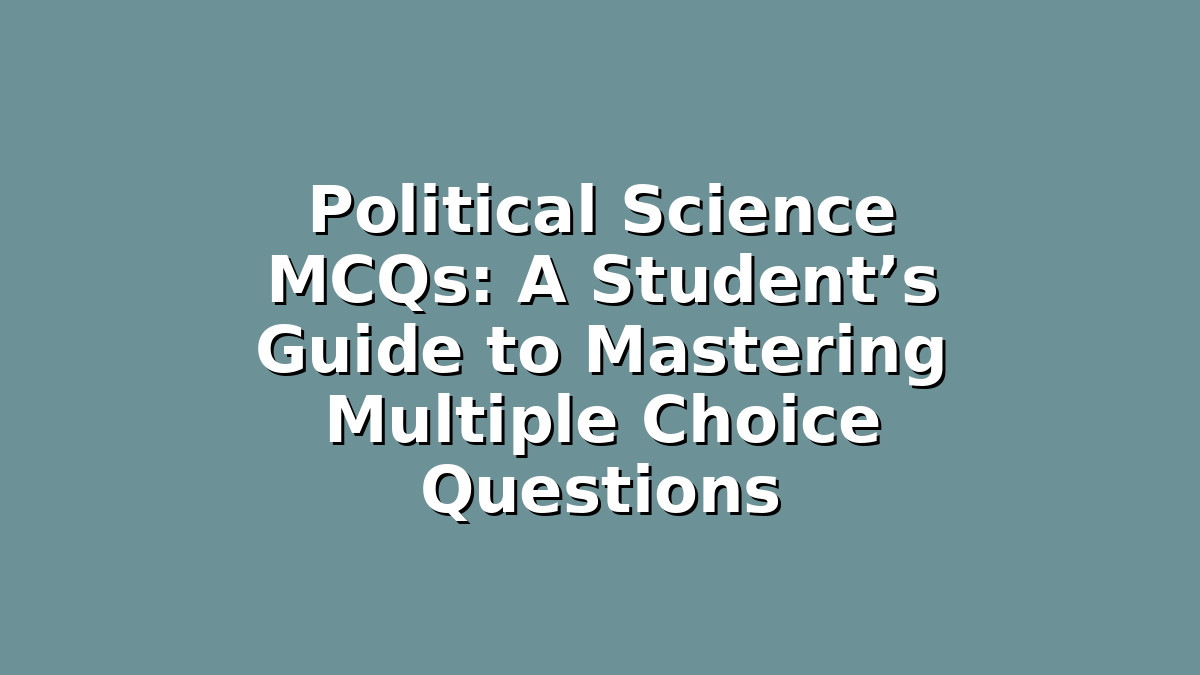Preparing for exams can be a daunting task, especially when it comes to subjects like Political Science that encompass a wide range of theories, historical events, and complex concepts. One of the most common formats in Political Science exams is Multiple Choice Questions (MCQs). These questions test not only your factual knowledge but also your understanding of political systems, ideologies, and current affairs. If you are a student gearing up for Political Science exams or simply aiming to improve your grasp of the subject, this guide is for you. We will explore how to approach Political Science MCQs effectively, offer practical study tips, and share strategies to boost your confidence and performance.
Understanding the Nature of Political Science MCQs
Before diving into study tips, it’s important to understand what Political Science MCQs typically look like and why they are challenging. Unlike simple fact-recall questions, Political Science MCQs often require critical thinking because they can include:
– Definitions of key terms and concepts (e.g., democracy, federalism, sovereignty)
– Identification of political thinkers and their ideas (e.g., Machiavelli, Rousseau, Marx)
– Analysis of political institutions and systems (e.g., parliamentary vs. presidential systems)
– Current political events and their implications
– Application of theories to real-world scenarios
Because the questions can vary widely, it’s essential to have a broad yet detailed knowledge base. This means that your preparation should combine memorization with analytical understanding.
Section 1: Building a Strong Foundation with Effective Study Techniques
The first step to excelling in Political Science MCQs is building a solid foundation of knowledge. Here’s how you can do that efficiently:
1. Break Down the Syllabus: Political Science covers various branches such as Political Theory, Comparative Politics, International Relations, and Public Administration. Divide your syllabus into manageable sections and allocate study time accordingly. This helps avoid last-minute cramming.
2. Use Quality Study Materials: Choose textbooks and revision guides recommended by your instructors or known for their clarity. Supplement these with online resources such as academic websites or educational videos that explain complex topics visually.
3. Create Concise Notes and Mind Maps: Summarize key points and create mind maps to visualize how concepts connect. For example, mapping different types of governments under the umbrella of political systems can help you recall details easily during the exam.
4. Regular Revision: Political Science requires remembering dates, facts, and theories. Schedule regular revision sessions to consolidate your memory. Using flashcards for important terms and political thinkers can be highly effective.
By methodically organizing your study and using varied resources, you build confidence and reduce the overwhelming feeling that often accompanies exam preparation.
Section 2: Mastering MCQ Techniques for Political Science Exams
Once your foundational knowledge is in place, it’s vital to develop skills specific to tackling MCQs. Here are practical tips to improve your accuracy and speed:
1. Read Each Question Thoroughly: MCQs can be tricky because they often include closely related options. Pay attention to keywords like “except,” “not,” or “most likely,” which can completely change the meaning of the question.
2. Eliminate Wrong Answers First: Narrow down your choices by discarding obviously incorrect options. This increases your chances if you need to guess, and also helps clarify the correct answer.
3. Be Wary of Absolutes: Options containing words like “always,” “never,” or “only” are often (but not always) incorrect because political science concepts usually allow for exceptions and nuances.
4. Use Logical Reasoning: If unsure, try to apply political theories or principles you know to reason out the answer. For example, if the question is about the separation of powers, recall the basic functions of the executive, legislature, and judiciary.
5. Manage Your Time: Don’t spend too long on any one question. Flag difficult questions and return to them later, ensuring you answer all that you can first.
By practicing these strategies regularly during mock tests or past paper exercises, you train your brain to think critically under exam pressure.
Section 3: Leveraging Practice and Feedback to Improve
Practice makes perfect, and this is particularly true for MCQs in Political Science. Here’s how to incorporate effective practice into your study routine:
1. Use Past Question Papers: Practicing previous years’ exam MCQs helps you get familiar with question patterns and difficulty levels. It also highlights important topics frequently tested.
2. Take Timed Quizzes: Simulating exam conditions by timing yourself sharpens your speed and helps you learn to handle pressure.
3. Analyze Your Mistakes: After each practice session, review the questions you got wrong. Understand why you missed them—was it due to lack of knowledge, misreading the question, or a careless mistake? This reflection is crucial for improvement.
4. Join Study Groups or Online Forums: Discussing questions and answers with peers can expose you to different viewpoints and explanations. Sometimes, hearing a concept explained differently can enhance your understanding.
5. Seek Feedback from Teachers: Don’t hesitate to ask your instructors to review your practice tests and provide guidance. Their insights can help you focus on weak areas and clarify doubts.
Consistent practice combined with constructive feedback builds exam readiness and reduces anxiety.
Conclusion
Political Science MCQs may seem challenging at first, but with the right approach, you can master them and excel in your exams. Start by building a strong foundation with organized and varied study methods. Then, develop specific test-taking strategies to handle MCQs smartly. Finally, practice regularly and learn from your mistakes to continuously improve. Remember, confidence comes from preparation, and every small step you take now brings you closer to your goal.
Stay motivated, be patient with yourself, and keep your curiosity for politics alive. With dedication and the right strategies, Political Science MCQs will no longer be a source of stress but an opportunity to showcase your knowledge and critical thinking skills.
Good luck!

Responses